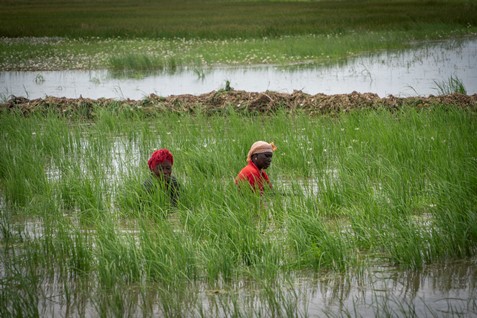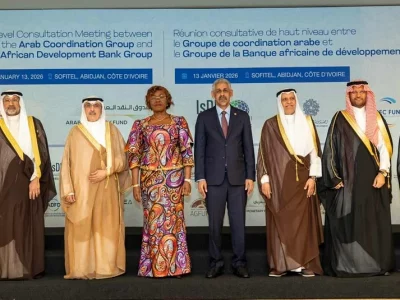Rice production in Benin has almost doubled in the space of three years, heading north from 406,000 tonnes in 2020 to nearly 712,000 tonnes in 2023 and thereby exceeding the initial target of 700,000 tonnes. Maize production rose to 1.7 million tonnes in 2023, compared with 1.5 million tonnes three years earlier. At the same time, the share of Benin’s cashew nut production that is processed inside the country more than doubled from 19 percent to 40.26 percent, thanks to processing operations at the Glo-Djigbé industrial zone.
The Glo-Djigbé zone is supported by the African Development Bank (AfDB) Group to support economic reforms in Benin. The impressive output results for rice and maize were also achieved thanks to the Bank’s support.
New lease of life
Agricultural producers in Benin have been given a new lease of life by two AfDB projects contained within its 2022-2026 country strategy for Benin. These are the Project to Support Agricultural Infrastructure in the Ouémé Valley and the Project to Support Food Production and Strengthen Resilience in the Departments of Alibori, Borgou and Collines. The impressive results figured in the mid-term Review of the 2022-2026 Country Strategy Paper of the African Development Bank, which was published on 11 February 2025.
These projects have enabled the development of 1022 hectares of hydro-agricultural land and 6522 hectares of lowlands in this West African country on the Gulf of Guinea. There has also been significant progress in milk production, which rose to 125.25 million litres in 2023 compared with 115 million litres in 2021, as well as in meat production, with production of 108,000 tonnes in 2023 compared with 87,000 tonnes in 2021.
Boosting port traffic
In the transport sector, the Bank’s interventions, particularly work in progress at Cotonou Port, should boost port traffic in Benin to 15 million tonnes in 2026 (9.57 million tonnes in 2023).
In the energy sector, some 1,447 km of high-voltage power lines are currently under construction, 5.2 km of medium-voltage lines have already been installed, and 1,584 km of low-voltage power lines are currently under construction, of which 101.55 km have been completed.
The work on electricity infrastructure has provided connection to 880 new users and has boosted the national level of access to electricity from 36.5 percent in 2020 to almost 40 percent in 2023. The level in rural areas has also improved, rising from 10.4 percent in 2020 to 12 percent in 2023.
Rise in access to safe drinking water
In the water and sanitation sector, levels of access to safe drinking water reached 80 percent in rural areas in 2023 thanks to the construction of 2,300 linear metres of water pipes and the connection of 31,486 water meters as part of projects financed by the AfDB. The Bank’s interventions have also considerably reduced the number of people in Benin at risk from flooding.
“The Bank and the Government of Benin aim to achieve rapid results by putting more emphasis on financial innovation, such as guarantee instruments to mobilise innovative financial solutions and results-based financing mechanisms,” said Robert Masumbuko, head of the AfDB’s country office in Benin.
AfDB Group is one of Benin’s main technical and financial partners. On 1 January 2025, the Bank Group’s active portfolio for Benin comprised 16 operations with total value of $1.2 billion.
Photo Caption: Benin’s agricultural sector has performed very well in recent years thanks to support from the African Development Bank Group.



















